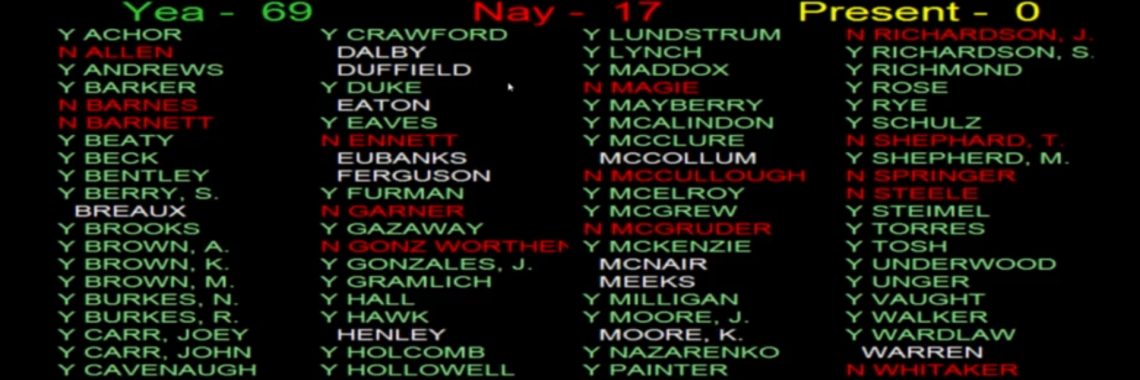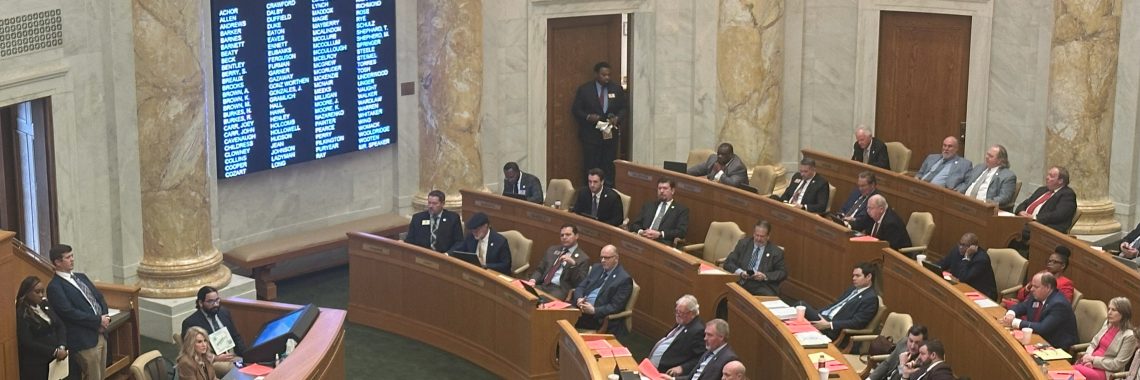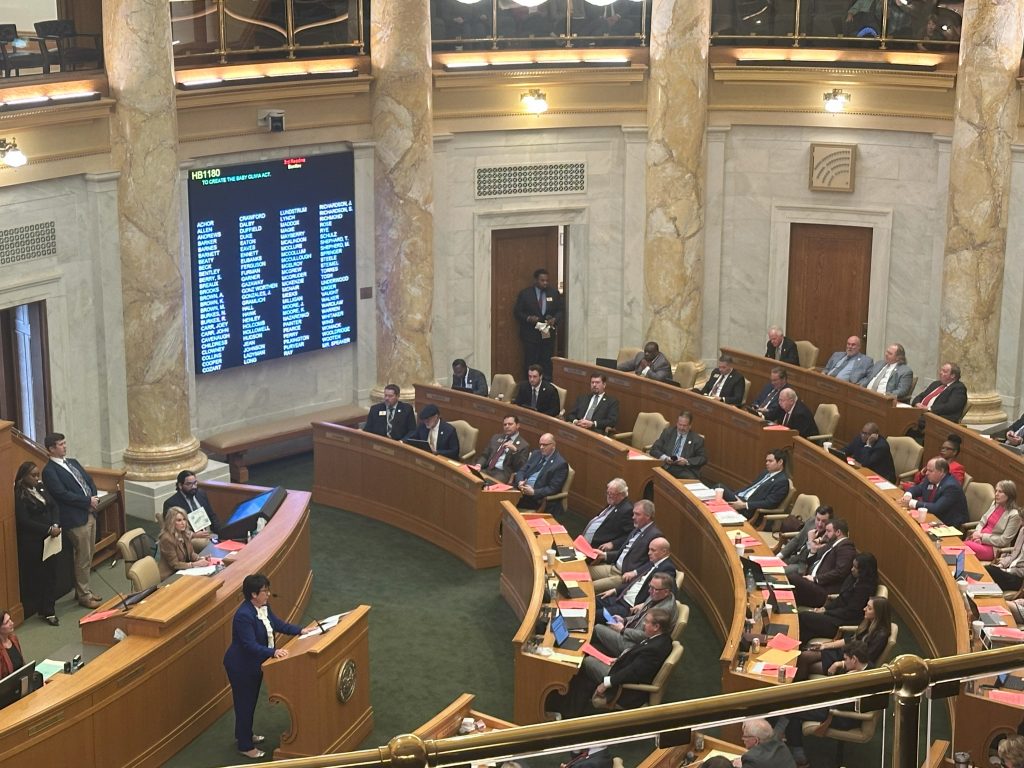From Life Issues to Legal Battles: Breaking Down Week 4 at the Capitol

The Arkansas Legislature is finishing its fourth week of the 2025 legislative session.
On Monday the House of Representatives rejected a bill expanding alcohol content in beer and malt beverages in Arkansas, and the Arkansas Senate rejected a measure expanding alcohol delivery.
On Tuesday the House Education Committee passed H.B. 1180 to create the “Baby Olivia Act” in Arkansas. Lawmakers also filed legislation to create an income tax credit for donations to pregnancy help organizations.
On Wednesday the Senate Judiciary Committee passed H.B. 1204, a bad bill limiting what people can receive in damages when they are injured through no fault of their own.
Family Council’s Church Ambassador Network also hosted its first 2025 gathering with ministers at the capitol.
On Thursday the Arkansas Senate narrowly passed H.B. 1204.
The Arkansas House of Representatives overwhelmingly passed H.B. 1180 to create the “Baby Olivia Act” in Arkansas.
Below is a brief legislative update from the capitol.
Good Bills Filed
H.B. 1139 (Religious Liberty): This good bill by Rep. Brit McKenzie (R — Rogers) and Sen. Joshua Bryant (R — Rogers) would strengthen Arkansas’ law concerning public school “released time.” The bill clarifies that public schools must excuse students from school, if the students’ parents request it, to receive religious instruction off-campus. Read The Bill Here.
H.B. 1180 (Pro-Life): This good bill by Rep. Mary Bentley (R — Perryville) and Sen. Clint Penzo (R — Springdale) ensures public schools show students a high-definition ultrasound video that is at least three minutes long as part of sex-education and human growth and development education courses. The bill also ensures students see Live Action’s computer-animated “Meet Baby Olivia” video that teaches about human development from conception to birth. Read The Bill Here.
H.B. 1202 (Pro-Life): This good bill by the Joint Budget Committee appropriates money for the Department of Finance and Administration for the 2025-2026 fiscal year. The budget includes $2 million in grant funding to pregnancy help organizations that promote maternal and infant wellness and provide material support to women with unplanned pregnancies. Read The Bill Here.
H.B. 1404 (Pro-Life): This good bill by Rep. Cameron Cooper (R — Romance) and Sen. John Payton (R — Wilburn) creates a tax credit for donations to pro-life pregnancy resource centers. Read The Bill Here.
H.B. 1142 (Bioethics): This good bill by Rep. Alyssa Brown (R — Heber Springs) and Sen. Jim Dotson (R — Bentonville) would promote ethical fertility treatments such as restorative reproductive medicine in Arkansas. The bill also protects healthcare providers who have conscientious objections to unethical in vitro fertilization (IVF) and similar procedures. Read The Bill Here.
H.B. 1221 (Ballot Initiatives): This good bill by Rep. David Ray (R — Maumelle) and Sen. Kim Hammer (R — Benton) clarifies Arkansas’ laws concerning initiatives and referenda. The bill makes it clear that petition signatures expire at the end of a General Election cycle. This would prevent canvassers from collecting signatures across multiple election cycles and help ensure sponsors don’t submit old signatures that are outdated or more likely to be invalid. Read The Bill Here.
H.B. 1222 (Ballot Initiatives): This good bill by Rep. David Ray (R — Maumelle) and Sen. Kim Hammer (R — Benton) clarifies Arkansas’ laws concerning initiatives and referenda. The bill the Arkansas Attorney General cannot approve a measure’s sponsors to begin collecting signatures to place a measure on the ballot if the measure conflicts with the U.S. Constitution or federal law. The bill also prevents sponsors from asking the attorney general to certify conflicting measures. Read The Bill Here.
S.B. 207 (Ballot Initiatives): This good bill by Sen. Kim Hammer (R — Benton) and Rep. Kendon Underwood (R — Cave Springs) requires petition canvassers to inform people that petition fraud is a crime before obtaining their signatures on a petition. Read The Bill Here.
S.B. 208 (Ballot Initiatives): This good bill by Sen. Kim Hammer (R — Benton) and Rep. Kendon Underwood (R — Cave Springs) requires canvassers to verify a person’s identity via photo ID before obtaining the person’s signature on a petition. This helps prevent people from fraudulently signing someone else’s name on a petition. Read The Bill Here.
S.B. 209 (Ballot Initiatives): This good bill by Sen. Kim Hammer (R — Benton) and Rep. Kendon Underwood (R — Cave Springs) clarifies that the signatures a canvasser collects will not count if the Secretary of State finds the canvasser has violated Arkansas’ laws concerning canvassing, perjury, forgery, or fraud in the process of gathering signatures. Read The Bill Here.
S.B. 210 (Ballot Initiatives): This good bill by Sen. Kim Hammer (R — Benton) and Rep. Kendon Underwood (R — Cave Springs) requires people to read the ballot title of the measure before signing a petition. The ballot title includes a summary of the ballot measure. Reading the ballot title helps ensure people understand the measure before they sign a petition to place the measure on the ballot. Read The Bill Here.
S.B. 211 (Ballot Initiatives): This good bill by Sen. Kim Hammer (R — Benton) and Rep. Kendon Underwood (R — Cave Springs) requires petition canvassers to file an affidavit with the Secretary of State verifying that the canvasser complied with the Arkansas Constitution and all Arkansas laws concerning canvassing, perjury, forgery, and fraud in the process of gathering signatures. Read The Bill Here.
S.B. 212 (Ballot Initiatives): This good bill by Sen. Kim Hammer (R — Benton) and Rep. Kendon Underwood (R — Cave Springs) creates the Document Validity Division within the Arkansas Secretary of State’s office to investigate, subpoena, and nullify fraudulent or false documents related to ballot initiatives. Read The Bill Here.
H.R. 1006 (Marriage): This good resolution by Rep. David Ray (R — Maumelle) recognizes February 7-14 as “National Marriage Week” in Arkansas. The measure notes how marriage is the foundation of strong families and societies and that healthy marriages improve people’s emotional, physical, and financial well-being. Read The Resolution Here.
H.B. 1162 (Good Friday): This good bill by Rep. Matt Duffield (R — Russellville) would establish Good Friday as an official state holiday in Arkansas. Some school districts in Arkansas already close in honor of Good Friday. This bill would ensure Arkansas’ public school students, teachers, and state employees are able to observe and celebrate Good Friday with their churches and their families. Read The Bill Here.
S.B. 49 (Used Car Tax): This good bill by Sen. Justin Boyd (R — Fort Smith) and Rep. Lee Johnson (R — Greenwood) would eliminate the sales tax on used cars sold for less than $10,000. Read The Bill Here.
S.B. 82 (Used Car Tax): This good bill by Sen. John Payton (R — Wilburn) would eliminate the sales tax on used cars sold for less than $10,000. Read The Bill Here.
H.B. 1082 (Internet Privacy): This good bill by Rep. Zack Gramlich (R — Fort Smith) and Sen. Justin Boyd (R — Fort Smith) generally prevents websites and similar platforms from collecting, using, or sharing personal data of users aged 16 or younger without parental or individual consent. It also addresses targeted advertising based on children’s personal data. Read The Bill Here.
H.B. 1083 (Internet Privacy): This good bill by Rep. Zack Gramlich (R — Fort Smith) and Sen. Justin Boyd (R — Fort Smith) requires internet platforms to adopt safety measures concerning data collection, harmful content, and advertising. The bill would require platforms to automatically default to the most protective privacy settings for minors, and it would require them to give parents tools to manage privacy settings, monitor usage, and restrict purchases for their children online. Read The Bill Here.
Bad Bills Passed
H.B. 1204 (Tort Reform): This bad bill by Rep. Jon Eubanks (R — Paris) and Sen. Missy Irvin (R — Mountain View) restricts what people can recover in damages when they are injured through no fault of their own. The bill effectively reduces what a person or company might be forced to pay when they injure an innocent person. H.B. 1204 benefits insurance companies who might not be forced to pay as much in lawsuits. That might increase the insurance companies’ profits, but there is no guarantee it will result in lower premiums for customers. Family Council has concerns about potential, unintended consequences this bill could have on families. See How Your Representative Voted Here. See How Your Senator Voted Here. Read The Bill Here.
Bad Bills Filed
S.B. 98 (Alcohol): This bad bill by Sen. Breanne Davis (R — Russellville) and Rep. John Maddox (R — Mena) expands alcohol delivery in Arkansas. The measure expands the list of stores that can deliver alcohol to include grocery stores, small farm wine convenience stores, and retail beer sellers. The bill also lets delivery companies obtain permits to deliver alcohol to consumers on behalf of the stores. Currently, retailers are directly responsible for ensuring all alcohol deliveries comply with state laws — including laws against delivering to minors. S.B. 98 shifts liability from the retailer to the delivery service. Right now, retailers have accountability in following alcohol laws. Under S.B. 98, alcohol deliverers may not have the same amount of oversight or accountability — which, for example, could increase the chances of alcohol being delivered to a minor. Read The Bill Here.
H.B. 1173 (Alcohol): This bad bill by Rep. Matt Brown (R — Conway) and Sen. Scott Flippo (R — Bull Shoals) raises the legal alcohol content for beer from 5% to 14% alcohol by weight, and it allows malt beverages to contain up to 21% alcohol by weight. Under this measure, beer could contain nearly three times as much alcohol as it currently does. That could make stronger alcoholic drinks more widely available in stores and other locations where beer is currently sold across Arkansas. Read The Bill Here.
H.B. 1011 (Abortion): This bad bill by Rep. Andrew Collins (D — Little Rock) would repeal virtually all of Arkansas’ pro-life laws, and it would legalize abortion throughout the state. Read The Bill Here.
S.C.R. 2 (DEI): This bad resolution by Sen. Jamie Scott (D — North Little Rock) and Rep. Jay Richardson (D — Fort Smith) calls Diversity, Equity, and Inclusion (DEI) “essential to creating a society where all individuals are valued, heard, and included,” and says that “efforts to attack DEI are harmful to the bottom line and health of our economy.” DEI policies are closely aligned with critical theory and have been shown to be bad for business and government. Read The Resolution Here.
H.B. 1013 (Bioethics): This bad bill by Rep. Ashley Hudson (D – Little Rock) governs fertility treatments in Arkansas. The bill would let fertility labs in Arkansas create, freeze, store, and kill human embryos as part of unethical in vitro fertilization—or IVF—practices. Human beings are not lab material. This bad bill fails to respect every unborn child’s right to life. Read The Bill Here.
H.B. 1014 (Bioethics): This bad bill by Rep. Andrew Collins (D — Little Rock) would require the State and Public School Life and Health Insurance Program to pay for unethical IVF practices. Read The Bill Here.
H.B. 1020 (School Choice): This bad bill by Rep. Andrew Collins (D — Little Rock) would repeal the 2023 LEARNS Act’s education freedom account program that lets students use public funds to pay for an education at a private school or at home. Read The Bill Here.
H.B. 1028 (Libraries): This bad bill by Rep. Andrew Collins (D — Little Rock) would repeal Arkansas’ laws that protect children from harmful sexual material. It also would let libraries lend or share obscene material, and it requires public libraries to have “a written policy prohibiting the practice of banning books or other materials because of partisan or doctrinal disapproval” in order to receive public funding. Read The Bill Here.
H.B. 1031 (Sex Education): This bad bill by Rep. Denise Garner (D — Fayetteville) would make it possible for the Arkansas Department of Education to implement Planned Parenthood-style sex education as part of larger changes to public school health curriculum. Read The Bill Here.
H.B. 1032 (LGBT): This bad bill by Rep. Andrew Collins (D — Little Rock) would prevent healthcare professionals from helping people overcome unwanted same-sex attraction or gender confusion. The way the bill is written, H.B. 1032 would let counselors, doctors, and other healthcare professionals encourage people to be LGBT, but healthcare professionals would not be able to help people overcome unwanted same-sex attraction or accept their biological sex. Read The Bill Here.
H.B. 1033 (Red Flag Law): This bad bill by Rep. Tippi McCullough (D — Little Rock) would create a “red flag” law in Arkansas making it easier for authorities to confiscate firearms from citizens that the government deem a danger to themselves or others. Read The Bill Here.
Other Legislation
H.B. 1018 (Family and Medical Leave): This bill by Rep. Andrew Collins (D — Little Rock) would create an income tax credit for employers who provide paid family and medical leave, such as maternity leave, to employees. Family Council has no position on this bill. Read The Bill Here.
H.B. 1044 (Raffles): This bill by Rep. R. J. Hawk (R — Bryant) and Sen. Jonathan Dismang (R — Little Rock) amends Arkansas’ charitable raffles and bingo laws. The bill would let colleges and universities conduct raffles in-person or online during sporting events. Schools would be able to sell raffle tickets themselves or use a nonprofit charity affiliated with the school to conduct the raffle. The bill contains a provision preventing casinos from operating or administering a raffle on a school’s behalf. Schools could use raffle proceeds to benefit school athletic programs — including purchasing and maintaining athletic facilities or providing financial aid, scholarships, stipends, and other compensation to student-athletes. Family Council has no position on this bill. Read The Bill Here.
H.B. 1323 (China): This bill by Rep. Mindy McAlindon (R — Centerton) prohibits Arkansas’ public pension and retirement system from investing in entities closely connected with the People’s Republic of China and the Communist Party of China. The measure does not affect private investments. The bill would help Arkansas avoid financial ties with companies affiliated with the Chinese government. Family Council has no position on this bill. Read The Bill Here.





